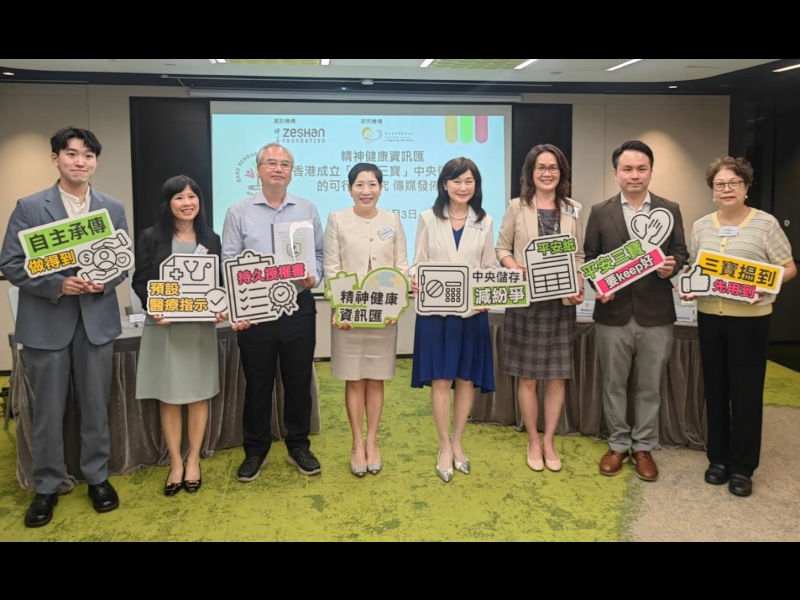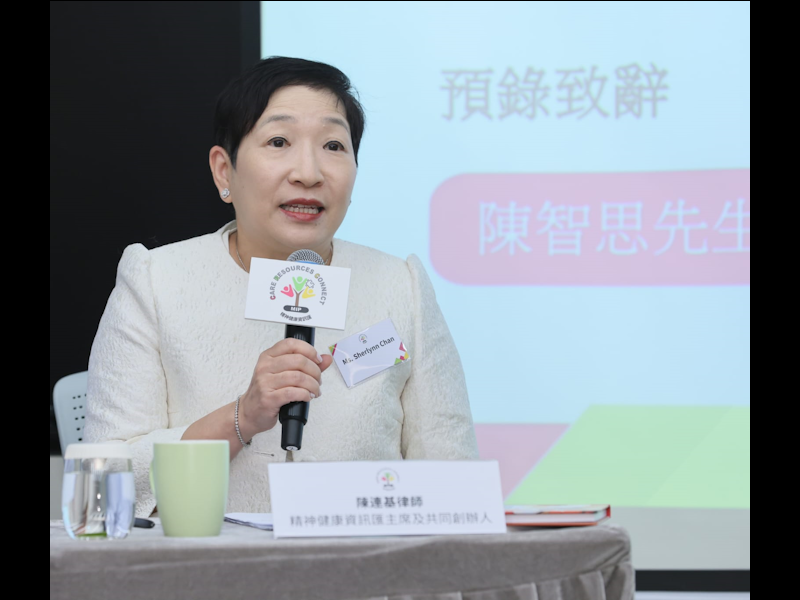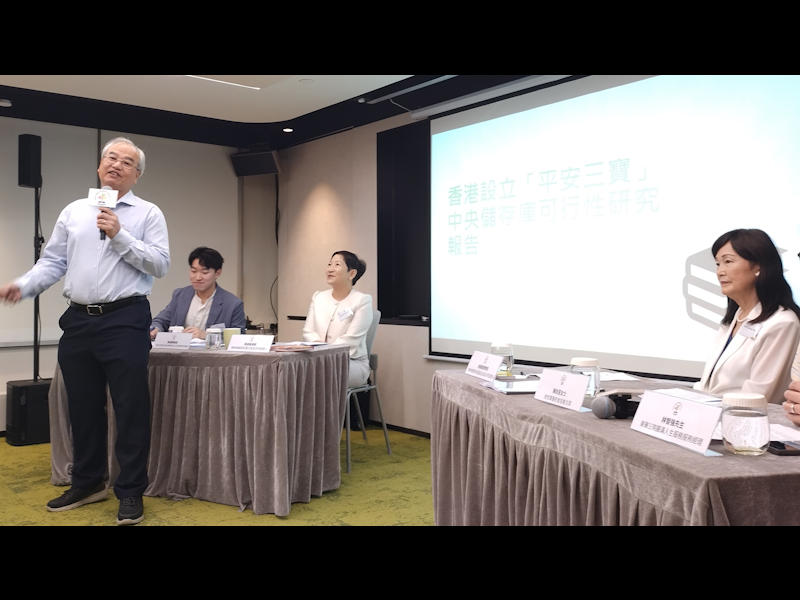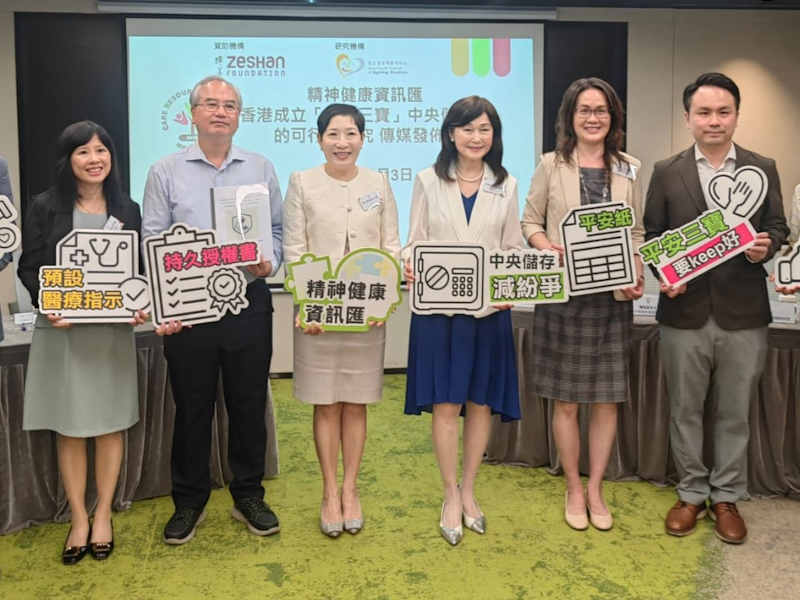Where have the “Three Instruments of Peace” Gone?
With an ageing population and a growing number of dementia cases in Hong Kong, there is increasing attention on the “Three Instruments of Peace” (IOPs) – Wills, Enduring Powers of Attorney, and Advance Medical Directives. Various NGOs and social enterprises have been promoting related information and services. However, while more and more people are setting up IOPs for themselves or their families, many remain concerned about where to store them.
Since 2021, the MIP Care Resources Connect (MIPCRC) has been exploring public views towards a central depository of IOPs. It found that one obstacle to setting up IOPs was that when someone becomes critically ill, loses their mental capacity, or passes away, it is not as easy as expected for their attorney or family members to execute their IOPs. This could be due, for example, to unclear storage location of the paper documents, or the attorney’s inability to access them. As a result, the family may be unable to know and honour their loved one’s wishes, leading to emotional and financial stress, and even regrets.
In 2024-2025, ZeShan Foundation funded MIPCRC to conduct a 9-month study titled Feasibility of Setting Up a Central Depository for Storing ‘Three Instruments of Peace’ in Hong Kong. MIPCRC commissioned the Asia-Pacific Institute of Ageing Studies at Lingnan University (LUAPIAS) to carry out evaluations of system frameworks, interviews with experts, and focus groups. A total of 55 stakeholders from different sectors were interviewed, including government officials, Legislative Council members, lawyers, doctors, nurses, social workers, IT professionals, patients, caregivers, and representatives of patient organizations. They were asked about the obstacles they faced at personal, professional, and systemic levels in creating and storing IOPs, as well as their views on a central depository of IOPs.
On 3 September 2025, MIPCRC announced the study results, findings, and recommendations in a press conference for reference and discussion across sectors. It emphasized the establishment of a depository within existing legal frameworks, so as to provide citizens with additional protection. Key recommendations are:
Citizens can choose to store different information according to their needs:
- First tier: Only records the document type, signing date, and location of the original documents, without details of the content. This could help family members and professionals quickly locate the originals while keeping privacy risks low.
- Second tier: Optional uploading of the encrypted scanned documents, which could be updated with newer versions. If the creator revokes or amends the documents, this is recorded in the system.
The depository is positioned as an active support system rather than just passive storage, aiming to increase the rate of document update by providing a professional directory, continuous follow-up, and public education. To ensure financial sustainability, a low one-off account creation fee is recommended, as well as small transaction charges for subsequent revisions. For those who are frail or lack the ability and time to complete the IOPs, the system operator will assist them in setting up the documents so that they too could benefit from its protection.
The depository will not override existing legal procedures, but rather provide additional protection. All registration is entirely voluntary, and citizens may choose to store some or all of their documents. If they change their mind in the future, they can revoke or delete the copies at any time without affecting the original legal validity.
To respond swiftly to the needs of older adults and patients, it is recommended that professional associations or NGOs with high public trust could collaborate to operate the IOPs Central Depository. Once the operator has built up experience and public trust, the government could be lobbied to take over its management through legislation, elevating it to a statutory body. This avoids the risks of inaction while waiting for legislation to ‘happen’, and ensures that pressing demands are addressed.
Suitable agencies will be selected as the system operator, and its detailed responsibilities, the depository’s operational and security protocols, and the user guidelines for document storage will be developed.
Tsz Kwan LAI
Assistant Operations Manager
ZeShan Foundation

Participants of Press Conference (from left to right):
- Mr. Wong Chi Kuen, Kevin, Research Officer, LUAPIAS
- Dr. Fong Meng Soi, Florence, Senior Lecturer, LUAPIAS
- Prof. Chan Chak Kwan, Dickson Research Professor and Director of LUAPIAS
- Ms. Sherlynn Chan, Chairman and Founding Member, MIPCRC
- Prof. Teresa Tsien, Vice Chairman & Founding Member, MIPCRC
- Ms. Irene So, Executive Director, ZeShan Foundation
- Mr. Leopard Lam Chi-keung, Service Manager (Endless Care Services), Tung Wah Group of Hospitals
- Ms. Tammy Chan, Chairman, The Salvation Army Carer Association

Ms. Sherlynn Chan shared the vision of MIPCRC and the need of establishing the Central Depository for “Three Instruments of Peace”.

Prof. Dickson Chan shared the research findings and recommendations.
Participants of Press Conference (from left to right):
- Mr. Wong Chi Kuen, Kevin, Research Officer, LUAPIAS
- Dr. Fong Meng Soi, Florence, Senior Lecturer, LUAPIAS
- Prof. Chan Chak Kwan, Dickson Research Professor and Director of LUAPIAS
- Ms. Sherlynn Chan, Chairman and Founding Member, MIPCRC
- Prof. Teresa Tsien, Vice Chairman & Founding Member, MIPCRC
- Ms. Irene So, Executive Director, ZeShan Foundation
- Mr. Leopard Lam Chi-keung, Service Manager (Endless Care Services), Tung Wah Group of Hospitals
- Ms. Tammy Chan, Chairman, The Salvation Army Carer Association
Ms. Sherlynn Chan shared the vision of MIPCRC and the need of establishing the Central Depository for “Three Instruments of Peace”.
Prof. Dickson Chan shared the research findings and recommendations.
With an ageing population and a growing number of dementia cases in Hong Kong, there is increasing attention on the “Three Instruments of Peace” (IOPs) – Wills, Enduring Powers of Attorney, and Advance Medical Directives. Various NGOs and social enterprises have been promoting related information and services. However, while more and more people are setting up IOPs for themselves or their families, many remain concerned about where to store them.
Since 2021, the MIP Care Resources Connect (MIPCRC) has been exploring public views towards a central depository of IOPs. It found that one obstacle to setting up IOPs was that when someone becomes critically ill, loses their mental capacity, or passes away, it is not as easy as expected for their attorney or family members to execute their IOPs. This could be due, for example, to unclear storage location of the paper documents, or the attorney’s inability to access them. As a result, the family may be unable to know and honour their loved one’s wishes, leading to emotional and financial stress, and even regrets.
In 2024-2025, ZeShan Foundation funded MIPCRC to conduct a 9-month study titled Feasibility of Setting Up a Central Depository for Storing ‘Three Instruments of Peace’ in Hong Kong. MIPCRC commissioned the Asia-Pacific Institute of Ageing Studies at Lingnan University (LUAPIAS) to carry out evaluations of system frameworks, interviews with experts, and focus groups. A total of 55 stakeholders from different sectors were interviewed, including government officials, Legislative Council members, lawyers, doctors, nurses, social workers, IT professionals, patients, caregivers, and representatives of patient organizations. They were asked about the obstacles they faced at personal, professional, and systemic levels in creating and storing IOPs, as well as their views on a central depository of IOPs.
On 3 September 2025, MIPCRC announced the study results, findings, and recommendations in a press conference for reference and discussion across sectors. It emphasized the establishment of a depository within existing legal frameworks, so as to provide citizens with additional protection. Key recommendations are:
Citizens can choose to store different information according to their needs:
- First tier: Only records the document type, signing date, and location of the original documents, without details of the content. This could help family members and professionals quickly locate the originals while keeping privacy risks low.
- Second tier: Optional uploading of the encrypted scanned documents, which could be updated with newer versions. If the creator revokes or amends the documents, this is recorded in the system.
The depository is positioned as an active support system rather than just passive storage, aiming to increase the rate of document update by providing a professional directory, continuous follow-up, and public education. To ensure financial sustainability, a low one-off account creation fee is recommended, as well as small transaction charges for subsequent revisions. For those who are frail or lack the ability and time to complete the IOPs, the system operator will assist them in setting up the documents so that they too could benefit from its protection.
The depository will not override existing legal procedures, but rather provide additional protection. All registration is entirely voluntary, and citizens may choose to store some or all of their documents. If they change their mind in the future, they can revoke or delete the copies at any time without affecting the original legal validity.
To respond swiftly to the needs of older adults and patients, it is recommended that professional associations or NGOs with high public trust could collaborate to operate the IOPs Central Depository. Once the operator has built up experience and public trust, the government could be lobbied to take over its management through legislation, elevating it to a statutory body. This avoids the risks of inaction while waiting for legislation to ‘happen’, and ensures that pressing demands are addressed.
Suitable agencies will be selected as the system operator, and its detailed responsibilities, the depository’s operational and security protocols, and the user guidelines for document storage will be developed.
Tsz Kwan LAI
Assistant Operations Manager
ZeShan Foundation

